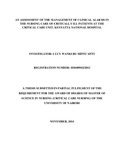| dc.contributor.author | Meng’anyi, Lucy W | |
| dc.date.accessioned | 2014-11-11T11:30:24Z | |
| dc.date.available | 2014-11-11T11:30:24Z | |
| dc.date.issued | 2014-11 | |
| dc.identifier.uri | http://hdl.handle.net/11295/74614 | |
| dc.description.abstract | Alarms play a crucial role alerting people on emergency situations. Clinical alarms in the hospital in the same sense are very crucial in determining the patient’s condition. This is more so in the critical care units where patients are unconscious and cannot speak out. The purpose of this study was to assess the practices of nurses in management of clinical alarms in the care of critically ill patients at the Critical Care Unit, Kenyatta National Hospital. The study was a descriptive cross sectional study conducted in the month of June 2014 where 87 nurses were recruited as study participants. A structured self administered questionnaire was used to collect data. Out of 87 respondents 48(55.2%) reported that “Always” the common causes of alarms to beep in the unit are changes in patient condition, 16(18.4%) due to mechanical errors, 22(25.3%) poor setting of alarm limits and 16 (18.4%) artifacts. The study participants scored an average 69% on the questions posed to them on knowledge of clinical alarms and 17(20%) nurses thought pulse oximetry on its own was the leading cause of alarm beep. There was a statistically significant association between the question on knowledge: “Wiping electrodes with a rough washcloth prevents spurious signals and helps to remove part of the stratum corneum allowing electrical signals to travel” with years worked in CCU (p=0.049), between questions on nurses’ interventions: “I change the patient's electrodes daily” with gender (p=0.028), “I assess the cause of the alarm beep when it alarms” with the age in years (p=0.028) and “I reset alarm settings of the machines each time I admit a patient” with whether trained in Critical Care Nursing or not (p=0.036). The study revealed that there is a deficit in knowledge on the management of clinical alarms and effective assessment and training on management of clinical alarms is necessary. Protocols and policies on alarm management are also not available and need to be developed. | en_US |
| dc.language.iso | en | en_US |
| dc.publisher | University of Nairobi | en_US |
| dc.title | An assessment of the management of clinical alarms in the nursing care of critically ill patients at the critical care unit, Kenyatta National hospital | en_US |
| dc.type | Thesis | en_US |
| dc.description.department | a
Department of Psychiatry, University of Nairobi, ; bDepartment of Mental Health, School of Medicine,
Moi University, Eldoret, Kenya | |
| dc.type.material | en_US | en_US |

